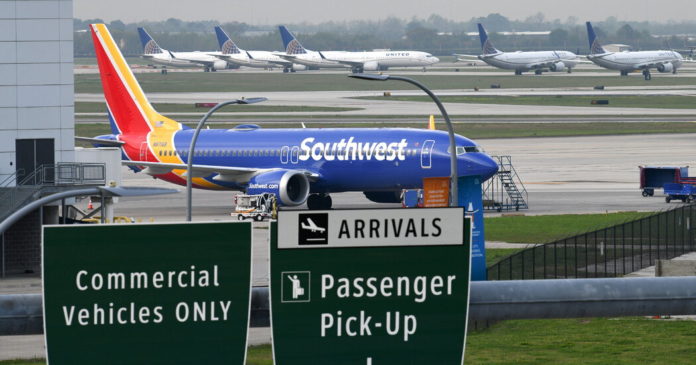
Southwest Airlines canceled more than 1,000 flights on Sunday and just over 800 on Saturday, wreaking havoc on weekend travel plans for thousands of passengers.
The airline had canceled 24 percent of all scheduled flights on Saturday, according to FlightAware, a tracking service. By noon on Sunday, Southwest had already canceled 28 percent of flights scheduled for the day, with hundreds more flights delayed.
“We experienced weather challenges in our Florida airports at the beginning of the weekend, challenges that were compounded by unexpected air traffic control issues in the same region, triggering delays and prompting significant cancellations,” the airline said in a statement on Sunday. “We’ve continued diligent work throughout the weekend to reset our operation with a focus on getting aircraft and crews repositioned to take care of our customers.”
Southwest added that recovering from the disruption was more difficult than usual because it is operating fewer flights than before the pandemic, complicating efforts to reschedule passengers.
“We know the frustration flight cancellations are creating for our customers and employees and we apologize, and we again thank everyone for patience as we work first to be safe, and second to be as quick as possible in solving disrupted plans.”
The Federal Aviation Administration said in a statement on Sunday that it had briefly suffered an air traffic control staffing shortage, but that the issue had long since been resolved.
“Flight delays and cancellations occurred for a few hours Friday afternoon due to widespread severe weather, military training and limited staffing in one area of the Jacksonville Air Route Traffic Control Center,” the agency said. “Some airlines continue to experience scheduling challenges due to aircraft and crews being out of place.”
Indeed, the weekend disruption appeared to be limited to Southwest. American Airlines had the second highest number of cancellations among U.S. carriers on Sunday, with fewer than 70 flights — about 2 percent of those scheduled for the day — affected.
Southwest suffered similar widespread disruptions over several days in June, which it attributed to technological problems, both internally and with a third-party weather data supplier. The delays prevented crews from reaching flights they were scheduled to work, exacerbating the problem.
In a statement on Saturday, Southwest’s pilots union said it was aware of the widespread cancellations. The union last week objected to the airline’s recent announcement that it would mandate vaccination against the coronavirus, but said that the cancellations were not the result of any pilot protest.
“We can say with confidence that our pilots are not participating in any official or unofficial job actions,” the union, the Southwest Airlines Pilots Association, said in the statement.
The union said that its members “will continue to overcome” management’s “poor planning” and other outside challenges, adding that Southwest pilots “always maintain the highest level of responsibility to their crews, their passengers, and our airline.”
A union representing Southwest flight attendants did not immediately respond to a request for comment.
What to Know About Covid-19 Booster Shots
The F.D.A. authorized booster shots for a select group of people who received their second doses of the Pfizer-BioNTech vaccine at least six months ago. That group includes: Pfizer recipients who are 65 or older or who live in long-term care facilities; adults who are at high risk of severe Covid-19 because of an underlying medical condition; health care workers and others whose jobs put them at risk. People with weakened immune systems are eligible for a third dose of either Pfizer or Moderna four weeks after the second shot.
Regulators have not authorized booster shots for recipients of the Moderna and Johnson & Johnson vaccines yet, but an F.D.A. panel is scheduled to meet to weigh booster shots for adult recipients of the Moderna and Johnson & Johnson vaccines.
The C.D.C. has said the conditions that qualify a person for a booster shot include: hypertension and heart disease; diabetes or obesity; cancer or blood disorders; weakened immune system; chronic lung, kidney or liver disease; dementia and certain disabilities. Pregnant women and current and former smokers are also eligible.
The F.D.A. authorized boosters for workers whose jobs put them at high risk of exposure to potentially infectious people. The C.D.C. says that group includes: emergency medical workers; education workers; food and agriculture workers; manufacturing workers; corrections workers; U.S. Postal Service workers; public transit workers; grocery store workers.
It is not recommended. For now, Pfizer vaccine recipients are advised to get a Pfizer booster shot, and Moderna and Johnson & Johnson recipients should wait until booster doses from those manufacturers are approved.
Yes. The C.D.C. says the Covid vaccine may be administered without regard to the timing of other vaccines, and many pharmacy sites are allowing people to schedule a flu shot at the same time as a booster dose.
Southwest said last week that it would join several of its competitors in requiring all employees to get vaccinated, setting a Dec. 8 deadline to do so. The mandate is necessary to continue doing business with the government after President Biden ordered all large federal contractors to require vaccination, Southwest said.
“Southwest Airlines must join our industry peers in complying with the federal government’s Covid-19 vaccination directive,” the airline’s chief executive, Gary Kelly, said in a statement announcing the mandate. “I encourage all Southwest employees to meet the federal directive, as quickly as possible, since we value every individual and want to ensure job security for all.”
The pilots union, which said it did not oppose vaccination, had warned that enforcement of such a mandate could lead to labor shortages and flight disruptions. The union is suing the airline for taking a series of “unilateral actions,” including the vaccination requirement.
In a Friday court filing, the union said the mandate “unlawfully imposes new conditions of employment” on pilots and asked a judge to stop the airline from enacting that requirement along with other policies and actions.
United Airlines, the first large U.S. carrier to impose a mandate, said recently that nearly all of its 67,000 employees had been vaccinated, except for about 2,000 who had applied for religious or medical exemptions and fewer than 250 who face being fired for failing to comply. American Airlines, Alaska Airlines and JetBlue Airlines have since followed suit.
Delta Air Lines has said it will not require vaccination, but will charge unvaccinated employees $200 more a month for health insurance.








